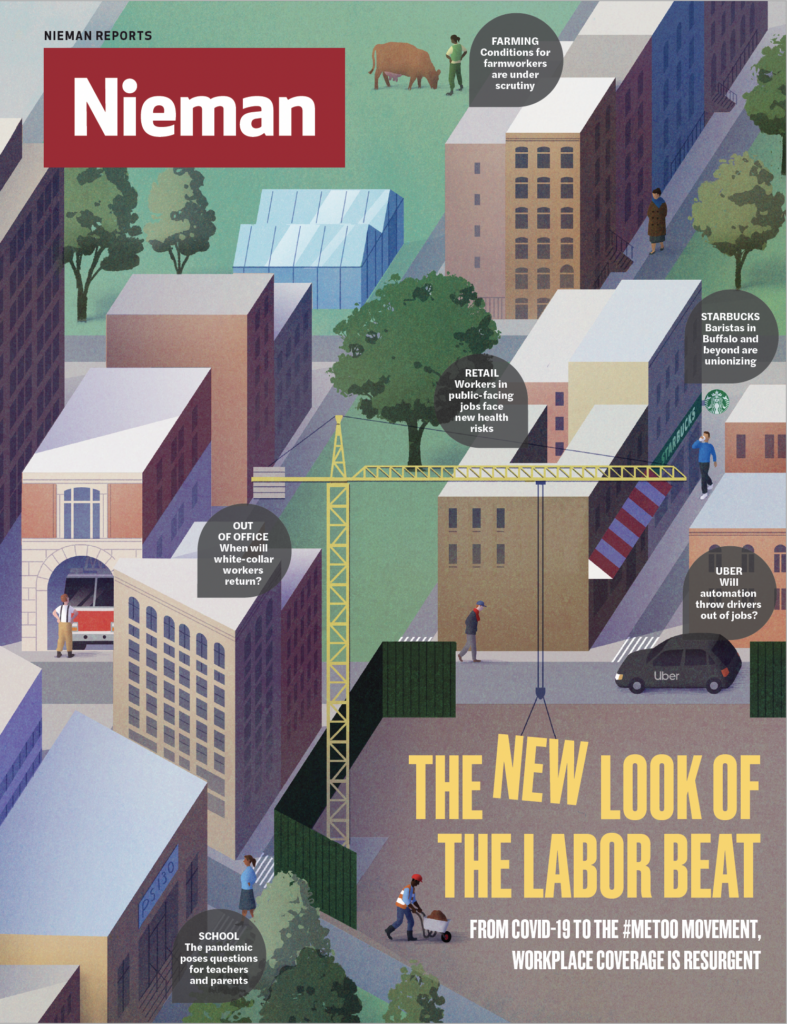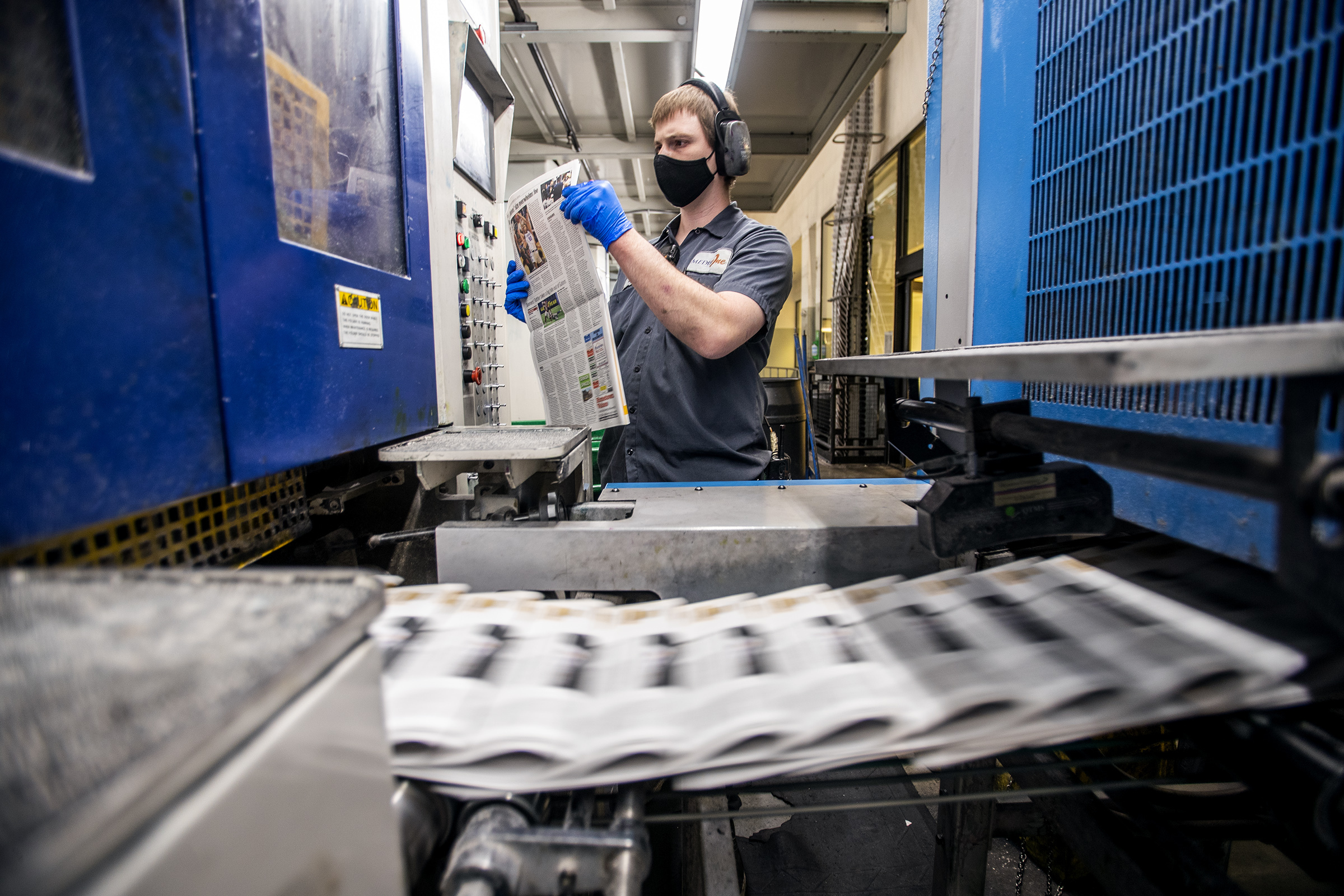
Once considered a marquee assignment, the labor beat spent years on the decline. Over the past decade, however, the beat has bounced back to cover everything from how Uber treats its workers to the #MeToo movement to the lack of affordable child care.
Fueled by the Great Recession, the rise of digital media, and the pandemic, today’s labor beat tackles a different set of questions from its union-centric predecessor: Will many white-collar workers never return to the office? Will pandemic-battered workers press for workplace safety? And will the Great Resignation cause American corporations to treat their workers far better?
Jonas Heese was skeptical. The Harvard Business School professor had heard the standard claims: When local newspapers close down, corporate corruption goes up. Yes, there was anecdotal evidence that national media could act as a corrective — perhaps a Wall Street Journal story about fraud at a production facility that hurt a company’s stock price. But Heese, a researcher of corporate crime, didn’t believe local news held the same sway.
“To be honest, I was probably more on the critical side,” he told me. “And even if local media can play a role, I thought maybe it’s still okay if it disappears because there are other things out there that would substitute. For example, social media, or some other monitors, maybe non-profit organizations, that shed light on problems. So, I was a little bit critical.”
Fueling Heese’s skepticism was a classic claim about media conflict-of-interest: If local newspapers rely on area businesses for advertising and their readers work at those companies, would reporters risk their wrath by targeting the firms for investigative reporting?
“There are arguments for why local media might not be good watchdogs,” Heese said. “Do you really have the incentive to go hard on those companies?”
If Heese was right, there would be little impact on the scale of corporate misconduct when a community’s newspaper shuttered. So he put his skepticism to a test and, with two other colleagues, designed a study to measure malfeasance before and after 33 local newspaper closures that impacted 45 U.S. counties. Using Violation Tracker, a public database of corporate misconduct, they examined violations and penalties issued by 44 government regulatory agencies from 2000 to 2017.
I suspect you know what happened next.
When a newspaper vanished, violations at area public companies rose by 1.1 percent and financial penalties by 15 percent. Just as concerning, said Heese, the severity of the documented fraud increased in the wake of a paper’s closure as measured by the size of the penalties. Toxic emissions — which companies are required to report even when they are not illegal — skyrocketed almost 20 percent after a newspaper folded.
The data examined by the researchers “captures how companies screw over their own employees, the environment, the government, or their shareholders,” said Heese, and included violations such as workplace safety and discrimination, accounting fraud and over-billing, and pollution. The documented misconduct, he said, is but “the tip of the iceberg.”
“This is a very conservative number because we can only capture the detected violations and we only focus on facilities of publicly-listed firms. But there are many, many other private companies that can also pollute the environment and mistreat their employees.”
I asked Heese how he felt now about his early hypothesis.
“Local newspapers really seem to matter,” he said. “Otherwise, we wouldn’t see that effect. If it was somehow possible on average that someone else stepped up and engaged in watchdog monitoring, then we should not be able to see that increase in violations. Local newspapers play an important role as a corporate monitor.”
Heese and his colleagues assert that their study provides “the first systematic evidence showing that the local press is an effective monitor of corporate misconduct.” Their disappearance, he said, is “a pretty big deal.”
In talking with Heese about his research, I saw how closely his initial skepticism mirrored common cultural assumptions about journalism, notably a vague belief that new digital actors have stepped up to replace the dying watchdogs. As one media executive recently tweeted: “The sooner legacy newspapers are bled to death, the sooner the disruptors will take over.” In the meantime, observe the flashing green light for costly corruption.
But Heese’s research and his own evolution of thought also show how inadequately journalists — and I’ll include myself here — have framed the stakes for our crumbling local news infrastructure. I recently participated in a public conversation about the rise of vulture investors as newspaper owners and was struck by a former reporter’s insular framing of why this mattered. Here are the key words from my notes: declining headcount, furloughs, wage cuts, buy outs, small pay increases, career limits. All of this described what was happening to the newsroom. None of it described what was happening to the community. Ours is not the only industry convulsed by economic and technological challenges or beset by job loss. We need a more persuasive public case, one that centers community members as stakeholders in the fight to preserve local journalism.
We like to argue that democracy hangs in the balance, and I believe that’s true. But that’s a squishy argument that can be claimed by many public servants and invites criticism of journalists as self-important. More effective is emerging research on local journalism’s impact on government accountability and spending. Likewise, an academic study from 2018 began to build the case that taxpayers will partly fund the cost of a shrinking local press corps, like it or not. “They found that with fewer watchdogs government salaries rise, deficits increase, and borrowing costs go up for 5 to 11 basis points,” Nieman Fellow Mary Ellen Klas wrote. “In dollar terms, an additional 10 basis points increases the cost of an average bond issue by $650,000.”
Research like this and like Heese’s seems fundamental to sorting out the future of local news. It is tangible and persuasive in a way that newsroom furloughs and democracy debates are not. The question of government funding for local news is decidedly different if a community is already effectively taxed for its newspaper’s demise through rising government salaries and corporate pollution.
It’s a rare day that I don’t see someone on social media complaining that a news story is behind a paywall. There’s an increasing amount of evidence that we can pay now, or we can pay later.
Read the full study:
When the Local Newspaper Leaves Town: The Effects of Local Newspaper Closures on Corporate Misconduct
By Jonas Hesse, Gerardo Pérez-Cavazos, and Caspar David Peter



